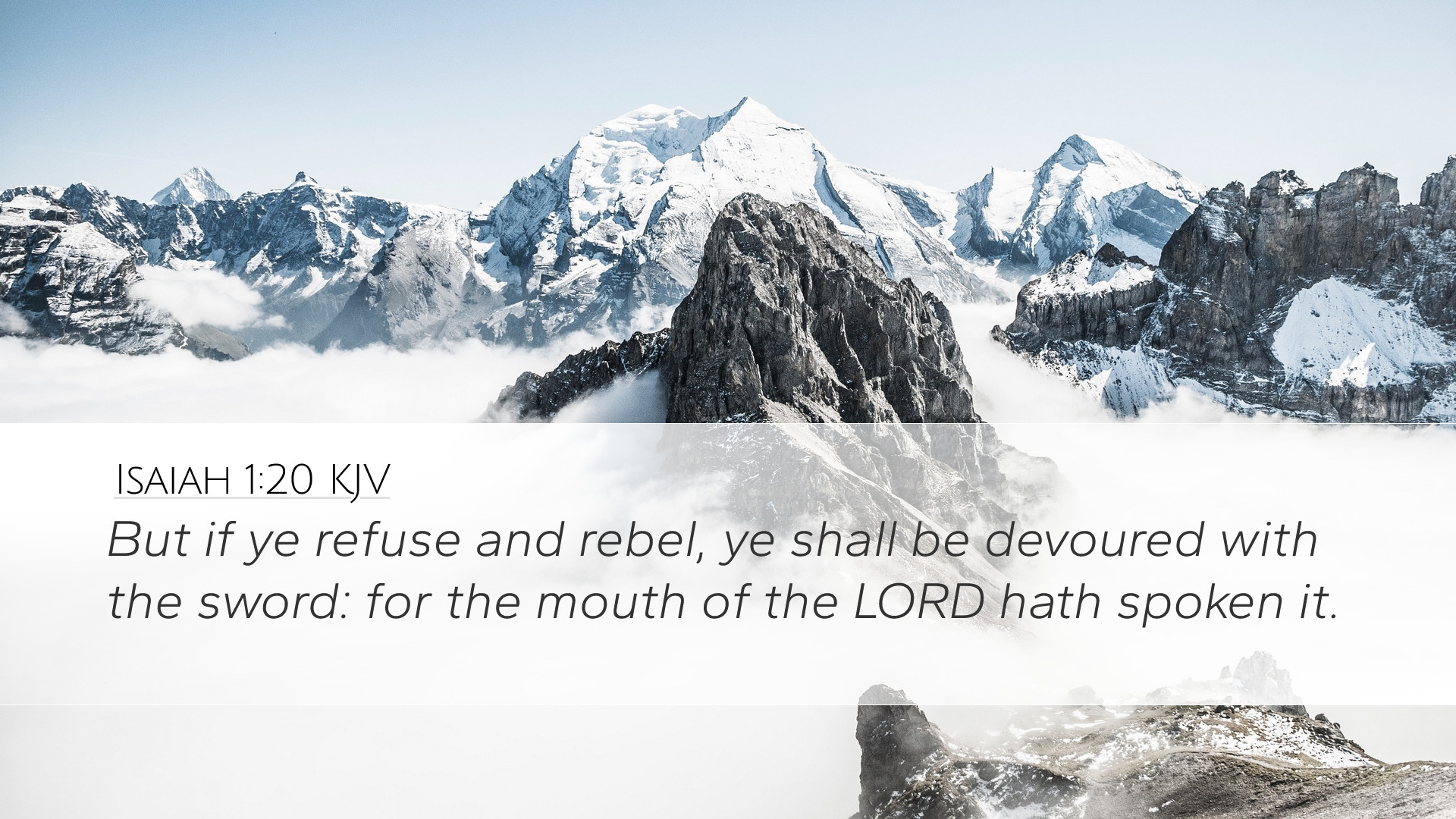Commentary on Isaiah 1:20
Verse: Isaiah 1:20 - "But if you refuse and rebel, you shall be eaten by the sword; for the mouth of the Lord has spoken."
Introduction
This verse serves as a stark warning encapsulating the gravity of rebellion against God's commands. It reflects a pivotal theme within the book of Isaiah: the dire consequences of disobedience juxtaposed with the opportunity for repentance and restoration. Understanding this verse requires a synthesis of theological, historical, and hermeneutical reflections.
Thematic Elements
- Divine Authority: The phrase “for the mouth of the Lord has spoken” underscores the inviolable authority of God’s word, suggesting that His declarations are not only promises but conditions of human experience.
- Consequences of Rebellion: The reference to being “eaten by the sword” illustrates the severity of divine judgment that accompanies rebellion, likening it to a fate of destruction inherent in the choice to oppose God.
- The Call to Obedience: The inclination towards refusal and rebellion highlights a recurring struggle for God's people, making the call for faithfulness especially poignant.
Commentators’ Insights
This section synthesizes thoughts from notable public domain commentators, providing a comprehensive examination of the verse.
Matthew Henry
Matthew Henry emphasizes that the choice laid before the people is monumental. He illustrates that the consequences of refusal are not merely physical but spiritual. The “sword” symbolizes both literal and metaphorical destruction, driving the point home that rebellion against God incurs His wrath. Henry also reflects on the grace offered to the people of Israel, contrasting their destined downfall with the possibility of redemption if they choose to heed God's call.
Albert Barnes
Albert Barnes provides a detailed interpretation of the implications of rebellion. He highlights that the language in Isaiah 1:20 is reminiscent of covenant curses found throughout Deuteronomy. He notes that the term “refuse and rebel” implies a conscious, willful act of defiance against God's commands. Barnes articulates the notion that such rebellion leads to inevitable destruction, serving as both a prophetic warning and an admonition to the faithful to remain steadfast.
Adam Clarke
Adam Clarke elucidates the context in which Isaiah delivers this message. He points out that Israel had strayed into idolatry and corruption, illustrating how this transgression has severed their relationship with God. Clarke suggests that the “sword” referenced is indicative of both divine judgment and the opportunities for reconciliation through repentance. He stresses the urgency of returning to God and highlights the richness of His mercy, affirming that despite their rebellion, God's arms remain open to receive the penitent heart.
Theological Implications
The implications of Isaiah 1:20 extend beyond its original context, resonating in contemporary theological discourse. This verse encapsulates the duality of divine justice and mercy, challenging pastors, theologians, and students to grapple with the necessity of obedience in the life of faith.
- Holiness of God: The holiness of God necessitates that sin be addressed. This verse reaffirms that God's covenant blessings are predicated on adherence to His statutes, positioning believers to recognize the gravity of their commitments.
- Human Agency and Responsibility: The stark choice presented highlights human agency; the call to choose signifies the accountability entrusted to each person regarding their faith journey and moral decisions.
- Hope in Repentance: Even amidst warnings of judgment, the overarching narrative encourages the possibility of forgiveness and restoration, fostering hope for believers who may stray from the path.
Practical Exhortation
For pastors and leaders, Isaiah 1:20 serves as a pivotal verse for sermon preparation and pastoral care. The themes of rebellion and consequence provide rich material for encouraging congregants to reflect on their relationship with God.
- Call to Examine One’s Heart: Encourage believers to assess their lives for areas of rebellion, fostering an environment of self-reflection and accountability.
- Preaching Repentance: Utilize this verse as a foundation for messages on the importance of repentance—emphasizing the joy and peace that follow true contrition.
- Emphasizing God’s Mercy: Highlighting God’s readiness to forgive can inspire hope in those feeling distant from God, restoring faith in His unwavering love.
Conclusion
Isaiah 1:20 delivers a profound message that resonates throughout generations. The severe warning echoes through the halls of Scripture, reminding us of the seriousness of sin and the boundless mercies available through repentance. Both a warning and an invitation, this verse calls all readers—whether theologians, pastors, or students—to commit to a life of obedience that reflects an authentic relationship with God.


